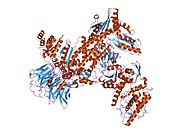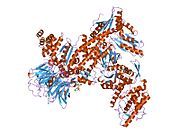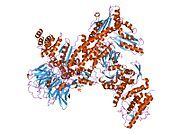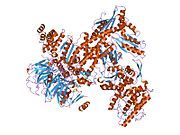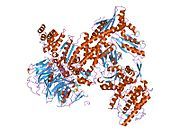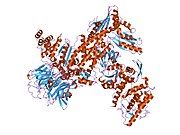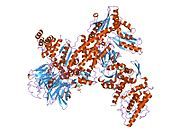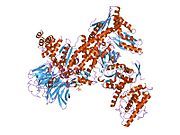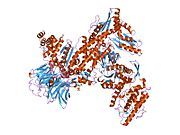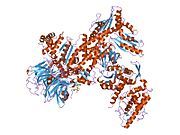ARPC2
Appearance
(Redirected from ARPC2 (gene))
Actin-related protein 2/3 complex subunit 2 is a protein that in humans is encoded by the ARPC2 gene.[5][6][7]
Function
[edit]This gene encodes one of seven subunits of the human Arp2/3 protein complex. The Arp2/3 protein complex has been implicated in the control of actin polymerization in cells and has been conserved through evolution. The exact role of the protein encoded by this gene, the p34 subunit, has yet to be determined. Two alternatively spliced variants have been characterized to date. Additional alternatively spliced variants have been described but their full length nature has not been determined.[7]
Interactions
[edit]ARPC2 has been shown to interact with Cortactin.[8]
References
[edit]- ^ a b c GRCh38: Ensembl release 89: ENSG00000163466 – Ensembl, May 2017
- ^ a b c GRCm38: Ensembl release 89: ENSMUSG00000006304 – Ensembl, May 2017
- ^ "Human PubMed Reference:". National Center for Biotechnology Information, U.S. National Library of Medicine.
- ^ "Mouse PubMed Reference:". National Center for Biotechnology Information, U.S. National Library of Medicine.
- ^ Machesky LM, Reeves E, Wientjes F, Mattheyse FJ, Grogan A, Totty NF, Burlingame AL, Hsuan JJ, Segal AW (1997). "Mammalian actin-related protein 2/3 complex localizes to regions of lamellipodial protrusion and is composed of evolutionarily conserved proteins". Biochem. J. 328 ( Pt 1) (Pt 1): 105–12. doi:10.1042/bj3280105. PMC 1218893. PMID 9359840.
- ^ Welch MD, DePace AH, Verma S, Iwamatsu A, Mitchison TJ (August 1997). "The human Arp2/3 complex is composed of evolutionarily conserved subunits and is localized to cellular regions of dynamic actin filament assembly". J. Cell Biol. 138 (2): 375–84. doi:10.1083/jcb.138.2.375. PMC 2138188. PMID 9230079.
- ^ a b "Entrez Gene: ARPC2 actin related protein 2/3 complex, subunit 2, 34kDa".
- ^ Weed SA, Karginov AV, Schafer DA, Weaver AM, Kinley AW, Cooper JA, Parsons JT (October 2000). "Cortactin localization to sites of actin assembly in lamellipodia requires interactions with F-actin and the Arp2/3 complex". J. Cell Biol. 151 (1): 29–40. doi:10.1083/jcb.151.1.29. PMC 2189811. PMID 11018051.
External links
[edit]- Human ARPC2 genome location and ARPC2 gene details page in the UCSC Genome Browser.
Further reading
[edit]- Couch FJ, Rommens JM, Neuhausen SL, Bélanger C, Dumont M, Abel K, Bell R, Berry S, Bogden R, Cannon-Albright L, Farid L, Frye C, Hattier T, Janecki T, Jiang P, Kehrer R, Leblanc JF, McArthur-Morrison J, Meney D, Miki Y, Peng Y, Samson C, Schroeder M, Snyder SC, Simard J (1996). "Generation of an integrated transcription map of the BRCA2 region on chromosome 13q12-q13". Genomics. 36 (1): 86–99. doi:10.1006/geno.1996.0428. PMID 8812419.
- Welch MD, Iwamatsu A, Mitchison TJ (1997). "Actin polymerization is induced by Arp2/3 protein complex at the surface of Listeria monocytogenes". Nature. 385 (6613): 265–9. Bibcode:1997Natur.385..265W. doi:10.1038/385265a0. PMID 9000076. S2CID 4358529.
- Näär AM, Beaurang PA, Zhou S, Abraham S, Solomon W, Tjian R (1999). "Composite co-activator ARC mediates chromatin-directed transcriptional activation". Nature. 398 (6730): 828–32. Bibcode:1999Natur.398..828N. doi:10.1038/19789. PMID 10235267. S2CID 23646963.
- Zhao X, Yang Z, Qian M, Zhu X (2001). "Interactions among subunits of human Arp2/3 complex: p20-Arc as the hub". Biochem. Biophys. Res. Commun. 280 (2): 513–7. doi:10.1006/bbrc.2000.4151. PMID 11162547.
- Robinson RC, Turbedsky K, Kaiser DA, Marchand JB, Higgs HN, Choe S, Pollard TD (2001). "Crystal structure of Arp2/3 complex". Science. 294 (5547): 1679–84. Bibcode:2001Sci...294.1679R. doi:10.1126/science.1066333. PMID 11721045. S2CID 18088124.
- Gournier H, Goley ED, Niederstrasser H, Trinh T, Welch MD (2001). "Reconstitution of human Arp2/3 complex reveals critical roles of individual subunits in complex structure and activity". Mol. Cell. 8 (5): 1041–52. doi:10.1016/S1097-2765(01)00393-8. PMID 11741539.
- Gevaert K, Goethals M, Martens L, Van Damme J, Staes A, Thomas GR, Vandekerckhove J (2003). "Exploring proteomes and analyzing protein processing by mass spectrometric identification of sorted N-terminal peptides". Nat. Biotechnol. 21 (5): 566–9. doi:10.1038/nbt810. PMID 12665801. S2CID 23783563.
- Kaneda A, Kaminishi M, Sugimura T, Ushijima T (2004). "Decreased expression of the seven ARP2/3 complex genes in human gastric cancers". Cancer Lett. 212 (2): 203–10. doi:10.1016/j.canlet.2004.03.020. PMID 15279900.
- Andersen JS, Lam YW, Leung AK, Ong SE, Lyon CE, Lamond AI, Mann M (2005). "Nucleolar proteome dynamics". Nature. 433 (7021): 77–83. Bibcode:2005Natur.433...77A. doi:10.1038/nature03207. PMID 15635413. S2CID 4344740.
- Dubois T, Paléotti O, Mironov AA, Fraisier V, Stradal TE, De Matteis MA, Franco M, Chavrier P (2005). "Golgi-localized GAP for Cdc42 functions downstream of ARF1 to control Arp2/3 complex and F-actin dynamics". Nat. Cell Biol. 7 (4): 353–64. doi:10.1038/ncb1244. PMID 15793564. S2CID 37000096.
- Cai L, Holoweckyj N, Schaller MD, Bear JE (2005). "Phosphorylation of coronin 1B by protein kinase C regulates interaction with Arp2/3 and cell motility". J. Biol. Chem. 280 (36): 31913–23. doi:10.1074/jbc.M504146200. PMID 16027158.
- Cai L, Marshall TW, Uetrecht AC, Schafer DA, Bear JE (2007). "Coronin 1B coordinates Arp2/3 complex and cofilin activities at the leading edge". Cell. 128 (5): 915–29. doi:10.1016/j.cell.2007.01.031. PMC 2630706. PMID 17350576.
- Ewing RM, Chu P, Elisma F, Li H, Taylor P, Climie S, McBroom-Cerajewski L, Robinson MD, O'Connor L, Li M, Taylor R, Dharsee M, Ho Y, Heilbut A, Moore L, Zhang S, Ornatsky O, Bukhman YV, Ethier M, Sheng Y, Vasilescu J, Abu-Farha M, Lambert JP, Duewel HS, Stewart II, Kuehl B, Hogue K, Colwill K, Gladwish K, Muskat B, Kinach R, Adams SL, Moran MF, Morin GB, Topaloglou T, Figeys D (2007). "Large-scale mapping of human protein-protein interactions by mass spectrometry". Mol. Syst. Biol. 3 (1): 89. doi:10.1038/msb4100134. PMC 1847948. PMID 17353931.
External links
[edit]- ARPC2 human gene location in the UCSC Genome Browser.
- ARPC2 human gene details in the UCSC Genome Browser.









